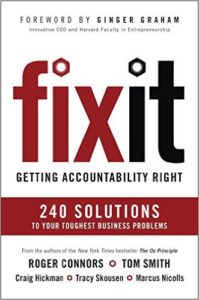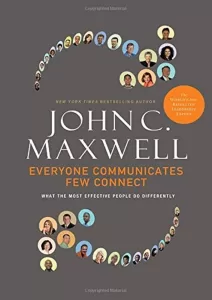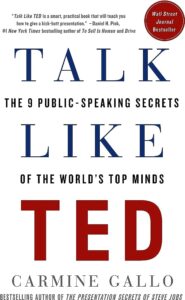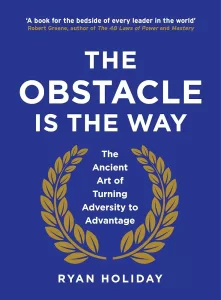Book Review: “Fix It”
Book: Fix It by Roger Connors, Tom Smith, Craig Hickman, Tracy Skousen, and Marcus Nicolls
Reviewer: Bobby Powers
My Thoughts: 8 of 10
When I cracked open my advanced copy of this book, I was a bit skeptical about the "choose your own adventure" format employed by the authors, but the format worked well. Fix It provides practical, actionable ideas that I've already begun to use with my team. The book is more pragmatic than many other leadership and management resources, as every concept is fleshed out in immediate solutions that other corporate leaders and executives have employed in their companies. Although some of the recommended solutions were a bit soft or seemingly unrelated to the specific topics in which they were mentioned, I learned a lot from this book and would rate it as one of the better business books I've read all year.
Takeaways from the Book
“Getting accountability right makes all the difference in the world and is the key to unlocking individual talent and potential.” -Ginger Graham
The authors' definition of accountability: “Accountability is a personal choice to rise above one’s circumstances and demonstrate the ownership necessary for achieving Key Results: See It, Own It, Solve It, and Do It.”
The 16 Accountability Traits
SEE IT: Acknowledging reality and seeing things as they really are
1) Obtaining the perspectives of others*
2) Communicating openly and candidly*
3) Asking for and offering feedback*
4) Hearing and saying the hard things to see reality
OWN IT: Connecting past efforts with what we are going to do to achieve what we want
5) Being personally invested
6) Learning from both successes and failures
7) Ensuring my work is aligned with key results
8) Acting on the feedback we receive*
SOLVE IT: Tackling real problems and removing true obstacles on your road to results
9) Constantly asking “What else can we do?”
10) Collaborating across functional boundaries
11) Creatively dealing with obstacles
12) Taking the necessary risks*
DO IT: Taking accountability to make things happen and get things done
13) Doing the things we say we will do
14) Staying “above the line” by not blaming others
15) Tracking progress with proactive and transparent reporting
16) Building an environment of trust*
*In the interest of brevity, I have only summarized ideas from six of the accountability traits rather than all sixteen. The summarized traits are identified with asterisks in the list above.*
Obtaining the Perspectives of Others
- “We all operate on limited information based on where we stand relative to the challenges we face. As a result, we rarely see the whole picture, relying instead on just our own bias and restricted point of view.”
- “If you’re too busy to walk the hallways or plant floor to chat with your people, too busy to let people know you want to know, then you’re doing something wrong.”
- “A certain degree of humility is critical to getting accountability right. Humility is a deep, authentic acknowledgment that we can’t do it alone, that we should be mindful of the perspectives others bring, and that we can be better and do more with input from others…Humility is on the list of the most essential leadership attributes because it strengthens one’s ability to learn. To be humble means to be teachable…Humility promotes a very personal and real recognition that the experiences and opinions of others matter, and that they can make a difference in your success.”

Communicating Openly and Candidly
- “A hallmark of a healthy creative culture is that its people feel free to share ideas, opinions, and criticisms…Candor is the key to collaborating effectively.” -Ed Catmull
- “You don’t want to be at a company where there is more candor in the hallways than in the rooms where fundamental ideas or policy are being hashed out. Seek out people who are willing to level with you, and…hold them close.” -Ed Catmull
- “Our advice: let go of the false belief that not being open and candid is ever an option. Instead, ask yourself, ‘What would I say if this were my own company, if it were my own money, my own reputation, my own legacy at stake?’”
- “Being open and candid is always better than letting truth languish in the shadows.”
- “Bad news never ages well.” -Alan Taylor
Asking for and Offering Feedback
- “Feedback is oxygen. It’s lifeblood. We can’t grow and develop without it.”
- “For more than two decades, working with thousands of organizations and hundreds of thousands of people at every organizational level, we have found one reliable rule: You probably won’t get feedback unless you ask for it.”
- “You will distinguish yourself in a very positive way if you become good at offering and asking for feedback.”
- "Feedback done properly is one of the highest forms of mutual respect one can express in a professional setting.”
Acting on the Feedback We Receive
- When your people suggest ideas you disagree with, you should not shut them down. Instead, respond with, “Thank you for sharing that with me.” You can (and should) close the loop later by saying, “You know, I had time to think about your idea, and I wanted to share my thoughts with you…”
- “Your first reaction should be one of gratitude.” -Jason Schubert
- “Acting on any feedback you receive will create the experience for others that you really do want feedback, and that you will consume it in a way that makes taking the risk to offer it worthwhile.”
- "It’s important to realize what a gift feedback is and treat it like that. I never, ever blow anyone up for telling me truly bad news. I try to categorize bad news and good news as ‘just news,’ and never, ever shoot the messenger. This attitude keeps the feedback channels open and the information flowing.” -Brad Lee
Taking the Necessary Risks
- “We have found that every breakthrough requires a ‘break with’ something. A break from the way you’ve always done things, from familiar patterns and systems, in order to try something untried, untested, or unproven.”
- “Great spirits have always encountered violent opposition from mediocre minds.” -Einstein
- “When you have exhausted all possibilities, remember this: you haven’t.” -Thomas Edison
- “Success is simply about working hard and delivering results and staying uncomfortable.” -Hugh Ekberg
- “Intentionally look for opportunities and make choices that will take you outside your comfort zone. And do this every day.” -Hugh Ekberg
Building an Environment of Trust
- “Trust is the outcome of getting accountability right, and becoming an accountable person.”
- “Yes, results are certainly important, but you should be more proud when folks who worked for you go on to succeed beyond you. That’s your badge of honor.” -Mark McNeil
- “Accountable people can be counted on to do what they say, to not blame others, and to listen carefully to their colleagues, all essential ingredients to building trust."
- “One sure way to foster greater trust in people is to help them see that you as a leader are doing everything possible to make them better, build them up, and promote them.”
- “To elevate others, you want to try to constantly eliminate your own job by teaching it to subordinates, so you don’t have to do today what you did yesterday.” -Hugh Ekberg
- "When people believe you care, trust is automatic.”
- “When you guide and don’t tell, people may fail a bit more, but they will also grow more, learn more, have more ownership, and bring more results to the company table.” -Jim Arnold
Think you’d like this book?
Other books you may enjoy:
- Crucial Conversations by Kerry Patterson, Joseph Grenny, Ron McMillan, and Al Switzler
- Creativity, Inc. by Ed Catmull with Amy Wallace
- The Five Dysfunctions of a Team by Patrick Lencioni
Other notable books by the authors:
Want to become a stronger leader?
Sign up to get my exclusive
10-page guide for leaders and learners.






